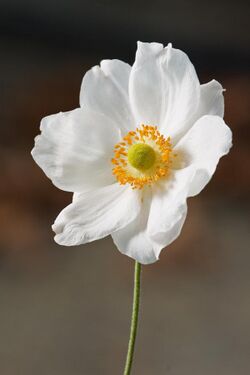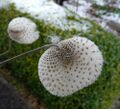Biology:Anemone hupehensis
| Anemone hupehensis | |
|---|---|

| |
| Japanese anemones have yellow stamens and white petals. | |
| Scientific classification | |
| Kingdom: | Plantae |
| Clade: | Tracheophytes |
| Clade: | Angiosperms |
| Clade: | Eudicots |
| Order: | Ranunculales |
| Family: | Ranunculaceae |
| Genus: | Anemone |
| Species: | A. hupehensis
|
| Binomial name | |
| Anemone hupehensis (Lemoine) Lemoine
| |
| Type | Flower |
|---|---|
| Light | Partial shade |
| Water | Moderate to large amount |
| Soil | Acidic soil |
| Hardiness | USDA Zone 4a to 8 |
| Bloom Period | White, pink, or purple color, late summer to early fall |
| Propagation | Root cutting[1] |
Anemone hupehensis, Anemone hupehensis var. japonica, and Anemone × hybrida (commonly known as the Chinese anemone or Japanese anemone, thimbleweed, or windflower) are species of flowering herbaceous perennials in the family Ranunculaceae.
Anemone × hybrida Paxton is a hybrid of Anemone hupehensis var. japonica and Anemone vitifolia.[2] It should not be confused with Anemone hybrida Miq. ex Pritz., a synonym of Anemone halleri All.
Description
Height is 3–4 ft (1–1 m). Leaves have three leaflets. Flowers are 40–60 mm (1.6–2.4 in) across, with 5-6 (or up to 20 in double forms) sculpted pink or white sepals and prominent yellow stamens, blooming from midsummer to autumn.
Taxonomy
Within the genus Anemone, A. hupehensis is situated within subgenus Anemone, section Rivularidium.[3] A. huppehensis var. japonica (Thunb.) Bowles & Stearn is more correctly named A. scabiosa H.Lév. & Vaniot.[4]
History
A. hupehensis is native to central China, though it has been naturalised in Japan for hundreds of years.
The species was first named and described in Flora Japonica (1784), by Carl Thunberg. Thunberg had collected dried specimens while working as a doctor for the Dutch East Indies Company.[5] In 1844, Robert Fortune brought the plant to England from China, where he found it often planted about graves.[6]
Cultivation
These plants thrive best in shady areas and under protection of larger plants, and in all but the hottest and the driest conditions in the United States.[7] They are especially sensitive to drought or overwatering.[5] They can be invasive or weedy in some areas,[8] throwing out suckers from the fibrous rootstock, to rapidly colonise an area. Once established they can be extremely difficult to eradicate.[9] On the other hand, they can take some time to become established.[10] A. hupehensis is one of a handful of species that are autumn flowering.[11]
Cultivars
The following cultivars have gained the Royal Horticultural Society's Award of Garden Merit:
- A. hupehensis 'Bowles's Pink'[12]
- A. × hybrida 'Elegance'[13]
- A. hupehensis 'Hadspen Abundance'[14]
- A. × hybrida 'Honorine Jobert'[15]
- A. × hybrida 'Königin Charlotte' ('Queen Charlotte')[16]
- A. hupehensis var. japonica 'Pamina'[17]
- A. × hybrida 'September Charm'[18]
Gallery
References
- ↑ "Anemone hupehensis/Anemone japonica". Rob's Plants. http://www.robsplants.com/plants/AnemoHupeh.php.
- ↑ "Learn2Grow: Anemone × hybrida 'Pamina'". http://www.learn2grow.com/plants/anemone-x-hybrida-pamina/.
- ↑ Wang et al 2009.
- ↑ The Plant List 2013, Anemone hupehensis var. japonica
- ↑ 5.0 5.1 Klingaman, Gerald (13 October 2006). "Plant of the Week Japanese anemone Latin: Anemone x hybrida". University of Arkansas Division of Agriculture. http://www.arhomeandgarden.org/plantoftheweek/articles/japanese_anemone_10-13-06.htm.
- ↑ "Anemone hupehensis 'Kriemhilde'". Paghat the Ratgirl. http://www.paghat.com/anemonekriemhilde.html.
- ↑ "Anemones". plantideas.com. Archived from the original on 23 December 2009. https://web.archive.org/web/20091223084623/http://www.plantideas.com/plants/anemones.html.
- ↑ "Anemone hupehensis var. japonica 'Bressingham Glow' (Japanese anemone)". The Taunton Press. Archived from the original on 3 January 2010. https://web.archive.org/web/20100103121933/http://www.finegardening.com/plantguide/anemone_hupehensis_var_japonica_bressingham_glow.aspx.
- ↑ RHS A-Z encyclopedia of garden plants. United Kingdom: Dorling Kindersley. 2008. p. 1136. ISBN 978-1-4053-3296-5.
- ↑ Feather, Judy (5 January 2010). "Japanese Anemone: Fall Color in the Garden". CSU/Denver County Extension Master Gardener. http://www.coopext.colostate.edu/4dmg/Flowers/Perenls/anemone.htm.
- ↑ Rudy 2004.
- ↑ "RHS Plant Selector – Anemone hupehensis 'Bowles's Pink'". https://www.rhs.org.uk/Plants/66590/Anemone-hupehensis-Bowles-s-Pink/Details. Retrieved 23 February 2020.
- ↑ "Anemone × hybrida 'Elegans'". RHS. https://www.rhs.org.uk/Plants/75076/Anemone-x-hybrida-Elegans/Details. Retrieved 12 April 2020.
- ↑ "RHS Plant Selector – Anemone hupehensis 'Hadspen Abundance'". https://www.rhs.org.uk/Plants/94662/Anemone-hupehensis-Hadspen-Abundance/Details. Retrieved 23 February 2020.
- ↑ "RHS Plant Selector – Anemone x hybrida 'Honorine Jobert'". https://www.rhs.org.uk/Plants/95098/Anemone-x-hybrida-Honorine-Jobert/Details. Retrieved 23 February 2020.
- ↑ "RHS Plant Selector – Anemone x hybrida 'Konigin Charlotte'". https://www.rhs.org.uk/Plants/112594/Anemone-x-hybrida-Konigin-Charlotte/Details. Retrieved 23 February 2020.
- ↑ "RHS Plant Selector – Anemone hupehensis var. japonica 'Pamina'". https://www.rhs.org.uk/Plants/138937/Anemone-hupehensis-var-japonica-Pamina/Details. Retrieved 23 February 2020.
- ↑ "RHS Plant Selector – Anemone x hybrida 'September Charm'". https://www.rhs.org.uk/Plants/1235/Anemone-x-hybrida-September-Charm/Details. Retrieved 23 February 2020.
Bibliography
- Wang, Wei; Lu, An-Ming; Ren, Yi; Endress, Mary E.; Chen, Zhi-Duan (January 2009). "Phylogeny and classification of Ranunculales: Evidence from four molecular loci and morphological data". Perspectives in Plant Ecology, Evolution and Systematics 11 (2): 81–110. doi:10.1016/j.ppees.2009.01.001.
- "Anemone hupehensis". The Plant List. Royal Botanic Gardens (Kew). http://www.theplantlist.org/tpl1.1/search?q=Anemone+hupehensis.
- "Anemone hupehensis var. japonica". The Plant List. Royal Botanic Gardens (Kew). http://www.theplantlist.org/tpl1.1/record/2638297.
- Wang, Wencai; Ziman, Svetlana N.; Dutton, Bryan E., "Anemone hupehensis", Flora of China, 6, http://www.efloras.org/florataxon.aspx?flora_id=2&taxon_id=200007452
External links
Wikidata ☰ Q1237805 entry




